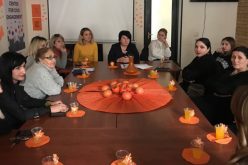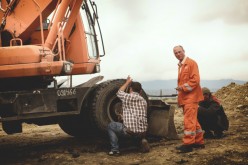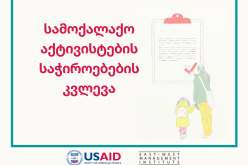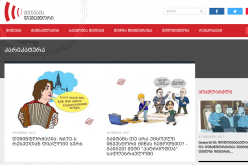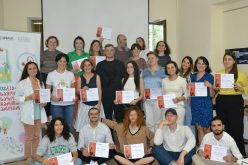Parents of LGBTIQ people in Georgia often face similar or harsher stigmas as their children. EWMI ACCESS supports Tbilisi Pride, a civic LGBTIQ movement, to bring them together and make them stronger
He had threatened to kill her son. His own son. They had been married for years, but he had crossed a line. “We never spoke openly about my son being gay,” says Lika, tears wellingup in her eyes while she recalls this time in their lives, “but we all knew.” Lika divorced her husband and silently continued to support her son. She never asked her son any questions.
Lika didn’t know how lonely she had been until one day in Borjomi, where unfamiliar faces spoke a thousand words without saying anything. She knew then and there, that she had found a new additional family: other parents of people from the LGBTIQ community.
Around 87% of Georgians said in 2019 that they would disapprove of doing business with a homosexual, according to the annual research by social sciences organization CRRC. In a survey the year previously commissioned by the National Democratic Institute (NDI) only 23% of the Georgian population believed that the protection of LGBT rights was important.
For LGBTIQ people, this means that their livelihoods are often in danger. A 2012 study by the Women’s Initiatives Supporting Group found that 32% of Georgian LGBT had at least once experienced physical violence and 89.93% had experienced psychological violence.
How society responds to LGBTIQ people, however, is also often endured by their close relatives, Giorgi Tabagari, founder and director of Tbilisi Pride explains. “The families are receiving harsher stigmas, they have to deal with the same situations as we, but they belong to a different generation,” he says, adding that older generations are in general more conservative and less approving of LGBTIQ people.
Tabagari had been an activist for almost a decade before he came out to his parents, and already then they had to deal with relatives and friends who fiercely disapproved.
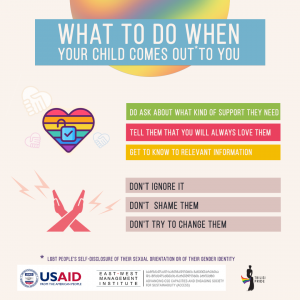 When he came out to his parents two years ago, his mom cried for months, his father became silent. “It felt like a funeral,” he adds. The pain he felt seeing his mother going through this process all alone, not even being able to talk about it with his father, made him realize he had to do something. It wasn’t just his parents going through the same.
When he came out to his parents two years ago, his mom cried for months, his father became silent. “It felt like a funeral,” he adds. The pain he felt seeing his mother going through this process all alone, not even being able to talk about it with his father, made him realize he had to do something. It wasn’t just his parents going through the same.
Tbilisi Pride started its Proud Families project funded by EWMI ACCESS to support and empower families of LGBTIQ people by bringing them together in workshops and informal meetings, facilitated by a professionally trained psychologist.
The parents, mostly moms, were approached through their own network – but that didn’t mean it wasn’t a lot of work. Everyone on the team was working around the clock, using every method they could think of to get them on board.
For Lika, who never had never talked with her son about his sexual orientation – the project was not talked about either. Her son had asked her to go to a conference in Borjomi. It was important to him, and he told her it would be important to her as well. Until she entered the conference room, she didn’t know yet where she was going. “I’ve always trusted my son, I had no doubts,” she says with a smile.
The first session the group held was extremely emotional or all, the tears flooded as if the gates were opened for the very first time. But they were among people they could trust, even if they didn’t know each other yet. There were hugs and words of comfort and understanding.
A few months into the program, the parents have become close friends. They are in app groups and meet each other in person. The support the parents have found through each other and with the help of the psychologist have also led to some other developments.
“Even though there is the stress of COVID-19, I feel at peace,” says Lika, “My brain is calm like it has never been.” For Lika and her son, the program has meant that they both finally feel comfortable enough to share more of their own lives with each other. Lika finally gets to know and meet the friends her son never told her about. “We’re really sharing anything now, I never thought this would be possible.
Tabagari says that this is one of the main reasons that they started the project. For LGBTIQ people, it can be hard to have an important part of your life, of your identity, missing from the relationship with your family. “It’s really important in Georgia because it’s largely a conservative country where the family values are really on the front line,” Tabagari says, and families are the one part of life which you usually can rely on for support. Unfortunately, LGBTIQ people often have severely restrained relations with their close relatives.
Although the organization was hoping that it would increase the mental well-being of family members, they could not have “dreamed” what would happen next.
“I was a bit afraid in the beginning, it’s an ambitious project,” says Tabagari, further explaining how even with those family members who did not reject their children, they still would avoid the topic at all cost, “but this project is an actual change maker, you’re gonna see some of the parents in the future on the front line of community pride March, waving their flags for their children.”





